Wildfire smoke exposure has been linked to an increased risk of heart failure (HF), particularly in older adults, women, and vulnerable populations. A recent study published in the Journal of the American College of Cardiology (JACC) titled “Long-term Wildfire Smoke Exposure and Increased Risk of Heart Failure in Older Adults” sheds light on the detrimental effects of prolonged exposure to wildfire smoke on heart health.
The study, the first of its kind on a national scale, compared the impact of wildfire smoke exposure on HF risk to other types of air pollution. Researchers found that as the levels of air pollution from wildfire smoke increased over a two-year period, so did the risk of developing HF. PM2.5, a type of air pollution made up of very small particles, can come from various sources, including wildfires. These particles can infiltrate deep into the lungs and even enter the bloodstream, posing significant health risks.
Lead author of the study, Hua Hao, Ph.D., emphasized the importance of even slight increases in smoke pollution on heart health, especially for vulnerable populations. The study found that each 1 microgram per cubic meter increase in PM2.5 levels from wildfire smoke over a two-year period led to a 1.4% increase in the risk of HF. This could potentially result in over 20,000 additional cases of HF annually in older adults in the U.S.
The association between smoke PM2.5 and HF was found to be stronger in women, Medicaid-eligible individuals, and those residing in lower-income areas, indicating higher susceptibility. Interestingly, the study revealed that the relative toxicity of wildfire smoke per unit of measure was greater compared to other types of air pollution.
As wildfire events become more frequent and intense due to environmental changes, the health risks associated with wildfire smoke are expected to escalate. Joan A. Casey, Ph.D., an author of the study’s editorial comment, highlighted the increasing prevalence of wildfire smoke days in the U.S., which now occur several times per year.
The study underscores the urgent need to address the growing threat to heart health posed by wildfire smoke. Harlan M. Krumholz, MD, Editor-in-Chief of JACC, emphasized the importance of environmental policy and healthcare preparedness in protecting communities from the adverse effects of wildfire smoke exposure.
While the study provides valuable insights, it does have limitations, including potential errors in measuring smoke PM2.5 concentrations and outcome misclassifications. Despite these limitations, the findings underscore the critical need to address the impact of wildfire smoke on heart health.
In conclusion, the study highlights the significant risk that long-term exposure to wildfire smoke poses to heart health, particularly for vulnerable populations. It underscores the importance of proactive measures to mitigate the impact of wildfire smoke on heart failure and protect public health.








